- Markets, finance and governance
- Sanitation as a business and business models
- Progress so far ... Sanitation Service Delivery Program (PSI with PATH and WSUP, funded by USAID) - Ghana, Ivory Coast and Benin
Progress so far ... Sanitation Service Delivery Program (PSI with PATH and WSUP, funded by USAID) - Ghana, Ivory Coast and Benin
253k views
- USAIDssd
-
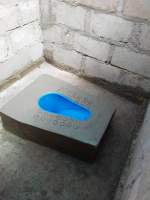
- SSD is a sanitation program funded by USAID, which aims to create sustainable sanitation market for the urban poor in Benin and Côte d'Ivoire. This market will elicit a demand for sanitation services and a reliable supply of high-quality sanitation products and services.
Less- Posts: 50
- Karma: 1
- Likes received: 9
Re: Lesson Learned from Sanitation Entrepreneur Selection in Côte d'Ivoire
Would you like to know how the SSD project funded by #USAID managed to recruit micro entrepreneurs in Sanitation? Discover the successes and learn from the failures of this approach? The attached document will certainly interest you. #Sanitation #KnowledgeManagement #KM #LessonsLearned #Share_experience #Accesstotoilet #TetraTech
Click on the link below to see more
- English Version
- French version
Learning and Communication Manager SSD|PSI Côte d’Ivoire
Attachments:
-
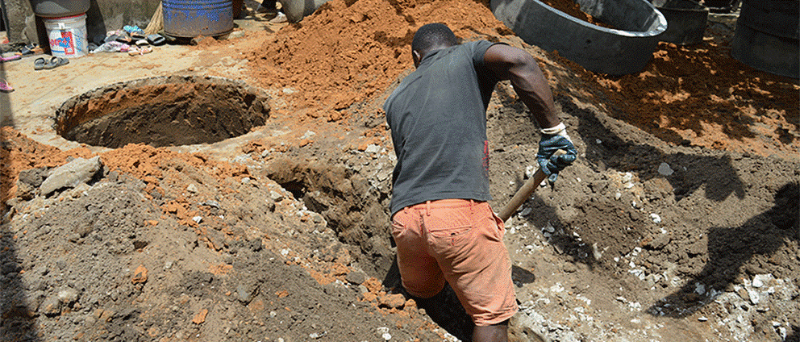 MicroEntre...djan.png
(Filesize: 754KB)
MicroEntre...djan.png
(Filesize: 754KB)
Please Log in to join the conversation.
You need to login to reply- USAIDssd
-

- SSD is a sanitation program funded by USAID, which aims to create sustainable sanitation market for the urban poor in Benin and Côte d'Ivoire. This market will elicit a demand for sanitation services and a reliable supply of high-quality sanitation products and services.
Less- Posts: 50
- Karma: 1
- Likes received: 9
Re: Paul Kpadonou: From Roadside Salesman to Millionaire Entrepreneur
Learning and Communication Manager SSD|PSI Côte d’Ivoire
Attachments:
-
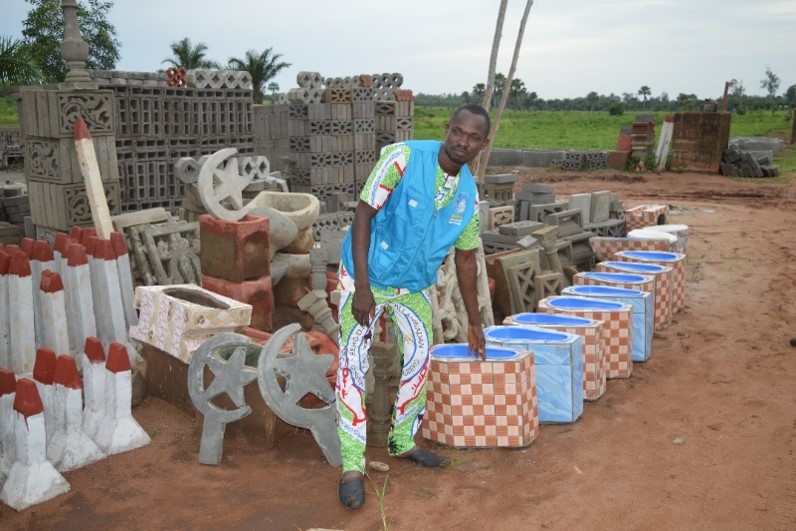 paulnewone.jpg
(Filesize: 122KB)
paulnewone.jpg
(Filesize: 122KB)
Please Log in to join the conversation.
You need to login to reply- Elisabeth
-
- User is blocked
- Freelance consultant since 2012
Less- Posts: 3372
- Karma: 54
- Likes received: 932
Re: Paul Kpadonou: From Roadside Salesman to Millionaire Entrepreneur
Hi Olivier,
Thanks for sharing this success story of Paul KPADONOU, the successful toilet entrepreneur! We don't often hear from people working in Benin or Ivory Coast so I really appreciate your updates.
Do you have some photos of Paul's successful toilets? I am curious what it looks like. Paul said:
Just as an aside: the photo of Paul on his motor bike with trailer and pipes looks very "this is Africa"... and dangerous to me!
See you,
Elisabeth
Thanks for sharing this success story of Paul KPADONOU, the successful toilet entrepreneur! We don't often hear from people working in Benin or Ivory Coast so I really appreciate your updates.
Do you have some photos of Paul's successful toilets? I am curious what it looks like. Paul said:
“I took the Sato pan and thought about how to adapt it to the defecation pot. And that's how I made a toilet with a colorful tile design, along with the rings and the slabs.”
Just as an aside: the photo of Paul on his motor bike with trailer and pipes looks very "this is Africa"... and dangerous to me!
See you,
Elisabeth
Dr. Elisabeth von Muench
Freelance consultant on environmental and climate projects
Freelance consultant on environmental and climate projects
Please Log in to join the conversation.
You need to login to reply- USAIDssd
-

- SSD is a sanitation program funded by USAID, which aims to create sustainable sanitation market for the urban poor in Benin and Côte d'Ivoire. This market will elicit a demand for sanitation services and a reliable supply of high-quality sanitation products and services.
Less- Posts: 50
- Karma: 1
- Likes received: 9
Re: Paul Kpadonou: From Roadside Salesman to Millionaire Entrepreneur
Mr. Paul KPADONOU is a contractor of sanitation products in Benin. He became a hugely successful businessman, earning millions of West African Francs per year, through the sale of materials that he uses to manufacture and install the WC Mimin, a type of latrine developed as part of the USAID-funded Sanitation Service Delivery (SSD) project. This project aims to improve access to sanitation products and services across urban areas in Benin through the private sector.
Paul Kpadonou, a young entrepreneur living in the Aboney-Calayi commune of Benin, has always dreamed of becoming a risk-taking and successful businessman. At 30 years old, Paul began his business career selling fencing materials and garden decorations on the side of the highway in the Glo-Yèkondo district.
During a promotional campaign for the WC Mimin brand held in his neighborhood, Paul learned about the unique value of high-quality latrines. Seeking to expand his professional experience and excited by the prospect of helping to improve the health of his community, Paul proactively reached out to the WC Mimin entrepreneurs to learn more about their work and to enroll in a training session.
He quickly became an expert in the construction of WC Mimin toilets – manual flush latrines coupled with two alternative-use offset pits. He learned how to build a toilet seat embedded with a plastic SATO pan, a product with a flap that creates a water seal with the pit, thereby eliminating odors and insects.
But Paul was determined to use his creativity to develop a brand-new product that would appeal to a wider range of consumers. Borrowing a concrete ring mold and the WC Mimin manufacturing manual from a fellow entrepreneur, he experimented with the materials to create his own molds for seaten position toilets.
“I took the Sato pan and thought about how to adapt it to the defecation pot. And that's how I made a toilet with a colorful tile design, along with the rings and the slabs.”
Paul’s expertise and passion for the product convinced the SSD project team to collaborate with him. After he successfully completing the WC Mimin training session, Paul was introduced to new customers by the SSD project’s Community Sanitation Advisors, responsible for promoting the WC Mimin brand and connecting clients to contractors.
Paul then devised a plan to build a WC Mimin in his home to serve as a model to show his customers and neighbors that he was not only a manufacturer, but also a user. As more and more curious members of the community visited Paul’s home to see his fully operational WC Mimin, orders quickly began rolling in. Within four days, he had built and installed toilets in multiple homes.
But his ingenuity didn’t stop there. In addition to manufacturing and installing the WC Mimin in his own home, Paul added a hand washing station, creating a “one stop sanitation shop.” Visitors were able to observe the full package of fully operational WC Mimin products.
Faced with increasing demand for sanitation products, Paul expanded his business by establishing five production and sales sites and hiring four masons. An efficient and dedicated entrepreneur, Paul is able to manufacture quality concrete rings, tiles, and defecation pots at a competitive price, generating a net profit of nearly twice the amount he earned by selling fencing materials alone.
In addition to the first store he opened, Paul now has 5 new stores where he sells the sanitation products he makes – 3 in Abomey Calavi and 2 in the municipality of Alada. To ensure he can reliably fill customer orders, he now employs 20 full-time assistants. To expand its sales network, Paul also established a relationship with 25 hardware stores where he displays his products for customers. Since beginning work with SSD, Paul has sold more than saying he has sold more than 1380 WC Mimin toilet products. In addition to managing his business, Paul regularly joins the SSD field team to educate community members about WC Mimin and to recruit potential clients.
After 18 months of activity with the SSD project, Paul generated a turnover of more than 60 million West African Francs and a profit margin of more than 11 million.
Proud to have reached the forefront of innovation, client satisfaction, and entrepreneurial success, Paul shared some of his key secrets to success:
Always be friendly and welcoming with customers
Keep substantial stocks of the necessary building materials for the WC Mimin
Use high-quality sand and cement to ensure the strength of nozzles and slabs
Remain actively involved in the marketing and sales activities and target homeowners without toilets
The sale of WC Mimin products has shown to be an effective strategy for invigorating the sanitation market, inspiring new entrepreneurs, and improving health in Benin. Through specialized training, high-quality products, and the commitment and ingenuity of entrepreneurs like Paul, the SSD project has helped to attract more and more clients seeking improved latrines and to expand the market for sanitation products in Benin
Learning and Communication Manager SSD|PSI Côte d’Ivoire
Attachments:
-
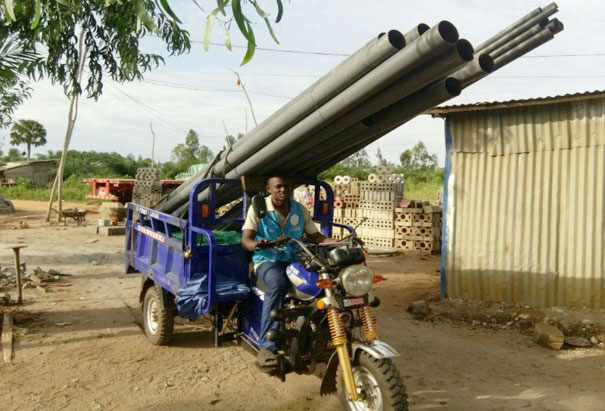 PAUL--bis.jpg
(Filesize: 76KB)
PAUL--bis.jpg
(Filesize: 76KB)
-
 paulnewone...9-25.jpg
(Filesize: 122KB)
paulnewone...9-25.jpg
(Filesize: 122KB)
Please Log in to join the conversation.
You need to login to reply- USAIDssd
-

- SSD is a sanitation program funded by USAID, which aims to create sustainable sanitation market for the urban poor in Benin and Côte d'Ivoire. This market will elicit a demand for sanitation services and a reliable supply of high-quality sanitation products and services.
Less- Posts: 50
- Karma: 1
- Likes received: 9
Re: Learning document ''Ensure the Quality of Sanitation Products During Project Scale-up''
we are proud to share with you a french and english version of a Learning document made by SSD on the pathway to ''Ensure the Quality of Sanitation Products During Project Scale-up'
Introduction
Achieving universal access to basic sanitation has been out of reach, largely due to the lack of affordable, high-quality, and accessible toilet options available to consumers.
To address this challenge, the USAID-funded Sanitation Service Delivery Project (SSD) uses a market-based approach to optimize the design of sanitation solutions and reduce the cost of pour-flush double-pit latrines, marketed as the ‘‘WC Mimin’’ brand. In its fourth and fifth years, the project has been scaling up product sales through private sector actors, with a focus on ensuring the quality of pre-fabricated toilet components and installation.
Click below to download the files (English and French version available)
English version
French version
Introduction
Achieving universal access to basic sanitation has been out of reach, largely due to the lack of affordable, high-quality, and accessible toilet options available to consumers.
To address this challenge, the USAID-funded Sanitation Service Delivery Project (SSD) uses a market-based approach to optimize the design of sanitation solutions and reduce the cost of pour-flush double-pit latrines, marketed as the ‘‘WC Mimin’’ brand. In its fourth and fifth years, the project has been scaling up product sales through private sector actors, with a focus on ensuring the quality of pre-fabricated toilet components and installation.
Click below to download the files (English and French version available)
English version
French version
Learning and Communication Manager SSD|PSI Côte d’Ivoire
Please Log in to join the conversation.
You need to login to reply- USAIDssd
-

- SSD is a sanitation program funded by USAID, which aims to create sustainable sanitation market for the urban poor in Benin and Côte d'Ivoire. This market will elicit a demand for sanitation services and a reliable supply of high-quality sanitation products and services.
Less- Posts: 50
- Karma: 1
- Likes received: 9
Re: SSD tests the integrity of sanitation facilities constructed for households in year 5 of implementation
The SSD project recently conducted integrity tests of toilets and sanitation systems built by micro-contractors over two years ago. In Abidjan, this test was carried out in the municipality of Yopougon where the first sanitation facilities were constructed. This test involved eight structures including septic tanks and soak away pits and concluded that the septic tanks were filling normally.
The walls were still intact, with a good distribution of sludge in the compartments. As for the soak away pits, the test confirmed the initial hypothesis, namely, a good infiltration of the overflow from the septic tank into the ground, with intact concrete rings as they were installed. However, the water level in the pits was too high, which showed that the infiltration area must be increased. Improvements to the design are now being incorporated.
In Benin, SSD project technical team conducted a survey of 18 users of Mimin latrines to check the level of pit filling in the municipalities of Abomey-Calavy and Porto Novo. At the end of the survey, it was found that only 35% of the pit for double pit latrines were filled after two years of use, which is a good level. 94% of the customers visited during this survey said they were satisfied with the use of the WC Mimin.
BENIN/CÔTE D’IVOIRE : SSD teste l’intégrité des ouvrages d’assainissement réalisés au bénéfice des ménages au cours de l’année 5 de la mise en œuvre
Après plus de 2 ans d’utilisation, le projet SSD a effectué des tests d’intégrité dans le but de vérifier la conformité de la proposition de valeur sur les ouvrages d’assainissement réalisés par les micro entrepreneurs partenaires au sein des ménages clients. Dans la ville d’Abidjan, ce test a été réalisé dans une commune, notamment la commune de Yopougon où le projet a vu ses premiers ouvrages réalisés. Le test a concerné huit ouvrages comprenant des fosses septiques et des puits d’infiltration.
Au terme du test il a été conclu que les fosses septiques réalisées se remplissaient effectivement après au moins deux ans d’utilisation.
Les parois des murs étaient toujours intactes, avec une bonne répartition des boues selon les compartiments. Quant aux puits perdus, leur observation après deux ans d’utilisation confirme l’hypothèse de départ à savoir, une bonne infiltration du trop-plein d’eau provenant de la fosse septique dans le sol, avec des buses en béton intactes que lors de leur pose. Cependant, après les deux ans d’utilisation, le niveau d’eau dans le puits était de 90 cm sur 210 cm, cela montre qu’il faut augmenter la surface d’infiltration. Ce test démontre que le système doit être amélioré.
Au Bénin, l’équipe technique du projet SSD a réalisé un sondage auprès de 18 utilisateurs des latrines Mimin pour vérifier le niveau de remplissage des fosses dans les communes d’Abomey-Calavy et de Porto Novo. A l’issue de l’enquête, il a été constaté un niveau de remplissage des latrines à doubles fosses à hauteur de 35% après deux ans d’utilisation par un ménage. 94% des clients visité lors de cette enquête ont déclaré être satisfaits de l’utilisation des WC Mimin.
Learning and Communication Manager SSD|PSI Côte d’Ivoire
Attachments:
-
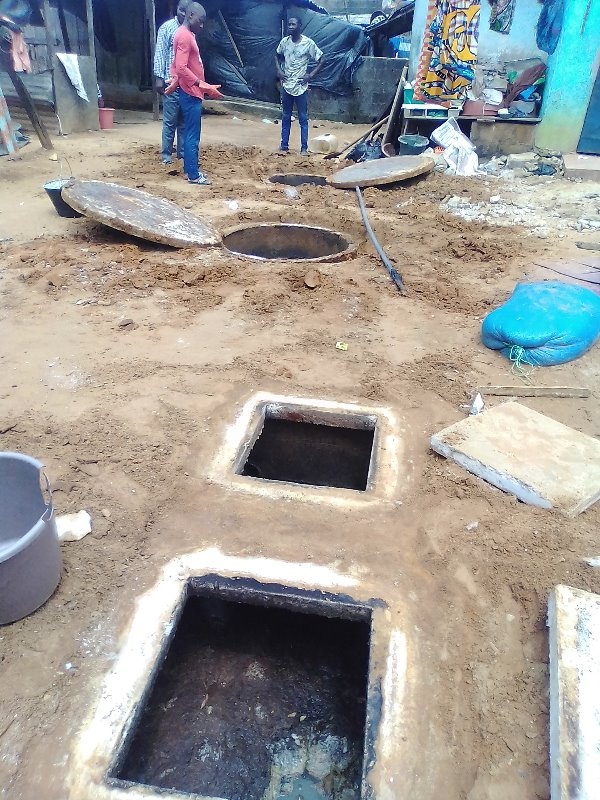 SepticTank...test.jpg
(Filesize: 180KB)
SepticTank...test.jpg
(Filesize: 180KB)
-
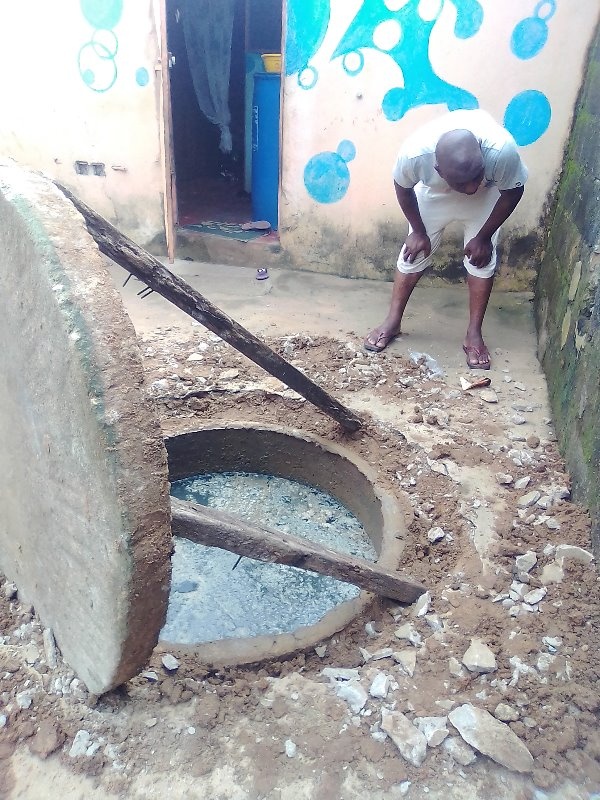 Soakawaypi...est-.jpg
(Filesize: 172KB)
Soakawaypi...est-.jpg
(Filesize: 172KB)
-
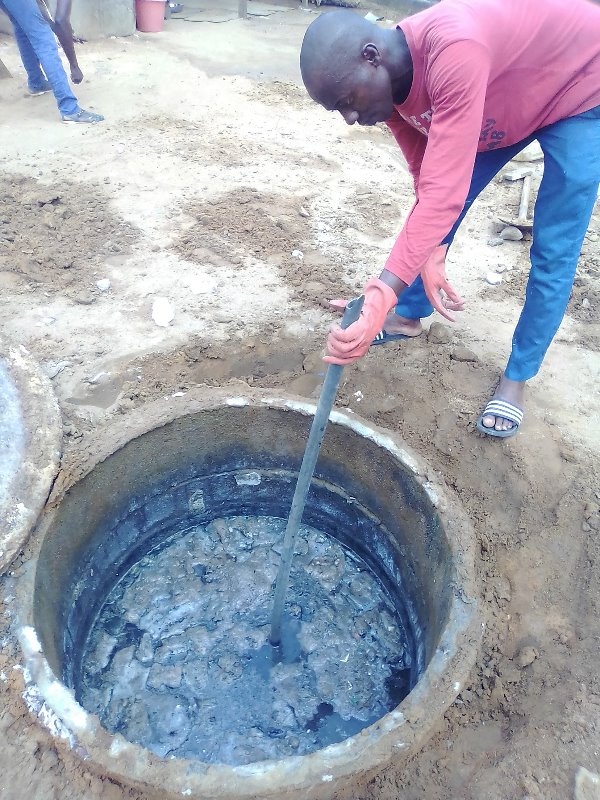 Soakawaypi...test.jpg
(Filesize: 175KB)
Soakawaypi...test.jpg
(Filesize: 175KB)
Please Log in to join the conversation.
You need to login to reply- USAIDssd
-

- SSD is a sanitation program funded by USAID, which aims to create sustainable sanitation market for the urban poor in Benin and Côte d'Ivoire. This market will elicit a demand for sanitation services and a reliable supply of high-quality sanitation products and services.
Less- Posts: 50
- Karma: 1
- Likes received: 9
Re: Paul Kpadonou: From Roadside Salesman to Millionaire Entrepreneur
Our manual flush toilets are connected to two leaking and alternating use infiltration pits. It is actually a wet system using manual flushing (squat slab or seat) and double pits, which collects partially digested humus-like material from the pit. Humus can be used after other treatments for soil improvement. It is a system suitable for peri-urban areas where the land can absorb black water (faeces, urine and anal cleansing water) continuously and appropriately. Since the black water from the double pit infiltrates directly into the surrounding farms lands, this system should only be installed when the free surface of the groundwater table is deep and not likely to be contaminated by the pits. It is therefore quite a sustainable sanitation system if the conditions for implementation are met.
Learning and Communication Manager SSD|PSI Côte d’Ivoire
Please Log in to join the conversation.
You need to login to replyRe: Paul Kpadonou: From Roadside Salesman to Millionaire Entrepreneur
Is scaling up of flush toilets discharging directly into sludge pits actually sustainable sanitation? Or are SSD just not providing sufficient detail to judge this system?
Dean Satchell, M For. Sc.
Vermifilter.com
www.vermifilter.com
Vermifilter.com
www.vermifilter.com
Please Log in to join the conversation.
You need to login to reply- USAIDssd
-

- SSD is a sanitation program funded by USAID, which aims to create sustainable sanitation market for the urban poor in Benin and Côte d'Ivoire. This market will elicit a demand for sanitation services and a reliable supply of high-quality sanitation products and services.
Less- Posts: 50
- Karma: 1
- Likes received: 9
Re: Sanitation Service Delivery Program in Ghana, Ivory Coast and Benin - Updates
Improving Demand and Supply for Septic Tank Emptying Services
In Abidjan, septic tank emptying is done by informal private sector operators who deliver low-quality services at high and random prices resulting in irregular servicing and frequent overflowing. In addition to repugnant inconveniences and public health hazards associated with overflowing tanks, toxic waters spread in courtyards and neighborhoods, polluting the environment and threatening the health of its occupants, especially affecting children. Households find that Vacuum Truck Operators are difficult to locate when needed because of their limited numbers and scattered location around town. They lack professionalism and practice high and inconsistent pricing.
SSD Launches the “Vidange Plus” Call Center
In view of this situation, the SSD project has developed a business model that facilitates access and increases demand for septic tank emptying services and offers a higher quality service at more affordable and transparent prices. The “Vidange Plus” Call Center was launched in Abidjan in October 2017 and has since been bringing supply and demand closer together by connecting households with better-performing Vacuum Truck Operators.
Challenges
- Non-compliance with negotiated harmonized prices.
- Lack of high capacity Vacuum Trucks.
- Maintaining quality of service.
- Recovery of the commission to be paid to the Call Center by the Vacuum Truck Operators.
Successes
- 906 emptying services performed via the Call Center as of April 2019.
- 6,646,000 liters of fecal sludge collected and dumped.
- 13,157 people benefited from improved emptying services.
- 20,945,500 FCFA earned by the Vacuum Truck Operators.
Answering Calls and Taking Orders is Not Enough
Linking operators to households can not be the only benefit offered by the Call Center to the Vacuum Truck Operators. Other benefits that are important expense items for the operators must be included in a “basket” of benefits offered by joining the Call Center network and agreeing to the terms of a signed agreement (work and safety equipment, gas and health insurance rebates, communication credits, access to finance, etc.). The success of the Call Center business model cannot be achieved without the sum of tangible and intangible benefits received and perceived by the operators being at least equivalent to the 10% commission they have to pay to the Call Center.
Learning and Communication Manager SSD|PSI Côte d’Ivoire
Attachments:
-
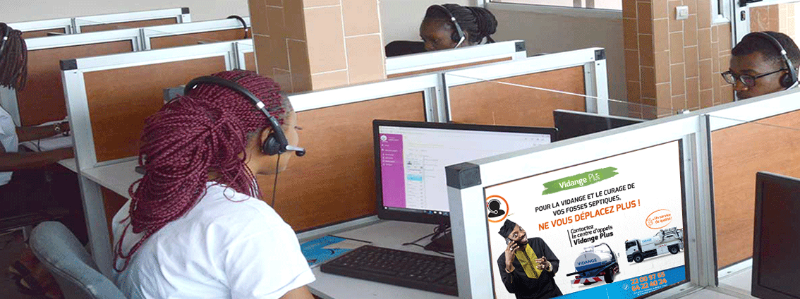 call-cente...case.png
(Filesize: 531KB)
call-cente...case.png
(Filesize: 531KB)
-
 TEAM.jpg
(Filesize: 24KB)
TEAM.jpg
(Filesize: 24KB)
Please Log in to join the conversation.
You need to login to reply- USAIDssd
-

- SSD is a sanitation program funded by USAID, which aims to create sustainable sanitation market for the urban poor in Benin and Côte d'Ivoire. This market will elicit a demand for sanitation services and a reliable supply of high-quality sanitation products and services.
Less- Posts: 50
- Karma: 1
- Likes received: 9
Re: Sanitation Service Delivery Program in Ghana, Ivory Coast and Benin - Updates
GHANA updates
Current state of affairs:
We have completed product design and cost optimization of round concrete tanks (RCTs) and double offset leach pit latrines ensuring designs are well adapted to the local context, especially for the latter - based on the PSI/ABMS’ WC MIMIN toilets in Benin. Through this work, we have also ensured price points are market-based and affordable.
Additionally, we have setup systems for scaling up sales, including selection and training of toilet artisans and toilet sales agents. We have also strengthened the role of the micro-finance institution (Sinapi Aba MFI) in providing landlords and micro-entrepreneurs with funds to support the construction of sanitation facilities.
We are currently selling toilets with the support of 50 sales agents using a series of intensive promotional campaigns in 12 target municipalities. Uptake of toilets has so far been encouraging but we envisage increasing sales rates as we roll out all promotional activities and the newly setup structures gain adequate traction for increased sales.
• Biggest successes so far:
One of the key successes is the level of engagement with municipal governments on the project. The project continues to strengthen relatinships with municipal governments in instituting sustainable structures for the delivery of our sanitation products and services. Specifically, our partnership with municipal governments has enable them to play a key role in selecting toilet sales agents (TSAs) and artisans. As TSAs and artisans are pivotal to our sanitation service delivery, gaining credibility for them and project objectives through increased engagement in their selection and in community sensitization processes is crucial. The project actively engages municipal governments in promoting toilet through durbars and other toilet campaigns to generate interest in toilets.
The project continues to leverage on these partnerships with municipal governments to strengthen enforcement of local sanitation regulations, to stimulate demand for household toilets.
• Main challenges / frustration:
While interest in our sanitation product continues to increase, people do not often prioritize the installation of toilets in their compounds – there is no sense of urgency to construct toilets. Which makes it difficult to close deals.
This suggests the need for more active enforcement of sanitation bylaws to encourage landlords to build toilets. We support the EHSD in sanitation enforcement and we are also making arrangements with them to follow up on TSA visits where uptake has been low. This would include setting daily targets for environmental health officers (EHOs) to conduct follow-up visits that could include a one-month moratorium on prosecution or serving notices to households if they do not comply.
This we believe will encourage and compel landlords to prioritize their sanitation needs and construct toilets.
Current state of affairs:
We have completed product design and cost optimization of round concrete tanks (RCTs) and double offset leach pit latrines ensuring designs are well adapted to the local context, especially for the latter - based on the PSI/ABMS’ WC MIMIN toilets in Benin. Through this work, we have also ensured price points are market-based and affordable.
Additionally, we have setup systems for scaling up sales, including selection and training of toilet artisans and toilet sales agents. We have also strengthened the role of the micro-finance institution (Sinapi Aba MFI) in providing landlords and micro-entrepreneurs with funds to support the construction of sanitation facilities.
We are currently selling toilets with the support of 50 sales agents using a series of intensive promotional campaigns in 12 target municipalities. Uptake of toilets has so far been encouraging but we envisage increasing sales rates as we roll out all promotional activities and the newly setup structures gain adequate traction for increased sales.
• Biggest successes so far:
One of the key successes is the level of engagement with municipal governments on the project. The project continues to strengthen relatinships with municipal governments in instituting sustainable structures for the delivery of our sanitation products and services. Specifically, our partnership with municipal governments has enable them to play a key role in selecting toilet sales agents (TSAs) and artisans. As TSAs and artisans are pivotal to our sanitation service delivery, gaining credibility for them and project objectives through increased engagement in their selection and in community sensitization processes is crucial. The project actively engages municipal governments in promoting toilet through durbars and other toilet campaigns to generate interest in toilets.
The project continues to leverage on these partnerships with municipal governments to strengthen enforcement of local sanitation regulations, to stimulate demand for household toilets.
• Main challenges / frustration:
While interest in our sanitation product continues to increase, people do not often prioritize the installation of toilets in their compounds – there is no sense of urgency to construct toilets. Which makes it difficult to close deals.
This suggests the need for more active enforcement of sanitation bylaws to encourage landlords to build toilets. We support the EHSD in sanitation enforcement and we are also making arrangements with them to follow up on TSA visits where uptake has been low. This would include setting daily targets for environmental health officers (EHOs) to conduct follow-up visits that could include a one-month moratorium on prosecution or serving notices to households if they do not comply.
This we believe will encourage and compel landlords to prioritize their sanitation needs and construct toilets.
Learning and Communication Manager SSD|PSI Côte d’Ivoire
Please Log in to join the conversation.
You need to login to reply- USAIDssd
-

- SSD is a sanitation program funded by USAID, which aims to create sustainable sanitation market for the urban poor in Benin and Côte d'Ivoire. This market will elicit a demand for sanitation services and a reliable supply of high-quality sanitation products and services.
Less- Posts: 50
- Karma: 1
- Likes received: 9
In Benin, the Sanitation Services Delivery project is operating Abomey Calavi and Porto Novo municipalities. About 17 micro entrepreneurs in Abomey-Calavi and 3 for Porto-Novo were able to build more than 3000 latrines for households after receiving practical training in construction "WC Mimin" latrines construction.
WC Mimin is a manual-flush latrine coupled with two alternating-use offset leach pits and a seated user interface that includes a SaTo pan. This improved latrine eliminates odors and keeps away flies and other insects that spread disease. This latrine is intended for low-income households living in urban and peri-urban areas in Benin.
Demand creation
The market-based approach used by the project aims to identify private operators and manufacturers of prefabricated building materials to produce a quality product. Through provision of training, equipment and start-up materials, the project seeks to turn existing micro entrepreneurs into sanitation product and service providers for the benefit of low-income households.
The demand creation strategy for "WC Mimin" is led by a team of 49 sales agents or community sanitation consultants for the two cities of Abomey-Calavi and Porto. These sales agents under the responsibility of a pool of 13 supervisors on the basis of one supervisor for every five sales agents or community sanitation advisors. The sales approach consists of conducting surveys by visiting households door-to-door to discuss their sanitation conditions, detect their sanitation troubles, make households realize the cost of their problems and then convince them to purchase ''WC Mimin'''.
Quality control strategy
Until April 2019, 2886 latrines were sold and installed in Abomey-Calavi and 313 in Porto Novo by micro entrepreneurs trained under the project. The project team ensures compliance with quality norms and standards by setting up several monitoring and control mechanisms. It should be noted that, after the perfect construction of 95% of latrines or latrine accessories without any failure the micro-entrepreneur can be declared capable of supplying "WC Mimin" products.
Quality controlTeam
SSD engineer and assistants are in charge of supervising and controlling the quality norms and standards for accessories and latrines built by artisans.
Masons, municipality hygiene officers, and the Environmental health officers are responsible for ensuring the quality of latrines built in a specific geographical area.
The various parties in charge of quality control determine a supervision schedule so that each actor is involved in the process to ensure compliance with norms and standards. The members of this team are involved simultaneously in different stages of the control process: before, during, and after construction.
Before construction
- The team ensures the quality of building materials, including cement and sand, and compliance with the designated dimensions of the molds for the defecation pot and slabs;
- The team conducts a strength test to measure the quality of the concrete used in prefabricated elements, carried out with a sclerometer or schmidt hammer. Following this test, non-conforming structures are destroyed.
During construction
- The team ensures proper adherence to certain requirements throughout the implementation of the WC Mimin latrines (distance between the pits, thickness of the concrete ring ,slab) and evaluates the skill of the mason.
After construction
Each quarter, the SSD team checks a sample of 25% of the latrines built to verify the value propositions of the Mimin brand, namely the absence of odors and the presence of a ventilation pipe and the hand washing device.
Indeed, once a month all the entrepreneur will be submit to a quality control check list witch is a several questions about the methodology and the technics to build ‘’WC Mimin’’.. Micro entrepreneurs were also provided a quality control reference guide, which includes the construction checklist as well as the required measurements and dimensions of materials used in the construction of latrines.
WC Mimin Latrine payment and way forward
In Abomey-Calavi as in Porto Novo, more than 90% of latrines have been installed thanks to the "Sanitation loans". A fund granted by SSD project to a microfinance to provide loans to needy households to finance their latrine construction. The household commits to refunds the loans to PEBco microfinance according to a clearly defined schedule.
This experience was a real success in Benin, since apart from the USD 10,000 fund granted by SSD, microfinance injected its own funds for a value of USD 238,940. This strong commitment of the financial partner is consistent with the results achieved with a credit recovery rate of 95.30%.
SSD project is scheduled to be completed in September 2019. In Benin, the SSD team organized a workshop with project stakeholders (entrepreneurs and microfinance PEBco), government stakeholders and municipalities to discuss how the project will be preserved and perpetuated once the SSD is completed. A sustainability plan should be developed on this subject to guide the actions to be taken.
WC Mimin is a manual-flush latrine coupled with two alternating-use offset leach pits and a seated user interface that includes a SaTo pan. This improved latrine eliminates odors and keeps away flies and other insects that spread disease. This latrine is intended for low-income households living in urban and peri-urban areas in Benin.
Demand creation
The market-based approach used by the project aims to identify private operators and manufacturers of prefabricated building materials to produce a quality product. Through provision of training, equipment and start-up materials, the project seeks to turn existing micro entrepreneurs into sanitation product and service providers for the benefit of low-income households.
The demand creation strategy for "WC Mimin" is led by a team of 49 sales agents or community sanitation consultants for the two cities of Abomey-Calavi and Porto. These sales agents under the responsibility of a pool of 13 supervisors on the basis of one supervisor for every five sales agents or community sanitation advisors. The sales approach consists of conducting surveys by visiting households door-to-door to discuss their sanitation conditions, detect their sanitation troubles, make households realize the cost of their problems and then convince them to purchase ''WC Mimin'''.
Quality control strategy
Until April 2019, 2886 latrines were sold and installed in Abomey-Calavi and 313 in Porto Novo by micro entrepreneurs trained under the project. The project team ensures compliance with quality norms and standards by setting up several monitoring and control mechanisms. It should be noted that, after the perfect construction of 95% of latrines or latrine accessories without any failure the micro-entrepreneur can be declared capable of supplying "WC Mimin" products.
Quality controlTeam
SSD engineer and assistants are in charge of supervising and controlling the quality norms and standards for accessories and latrines built by artisans.
Masons, municipality hygiene officers, and the Environmental health officers are responsible for ensuring the quality of latrines built in a specific geographical area.
The various parties in charge of quality control determine a supervision schedule so that each actor is involved in the process to ensure compliance with norms and standards. The members of this team are involved simultaneously in different stages of the control process: before, during, and after construction.
Before construction
- The team ensures the quality of building materials, including cement and sand, and compliance with the designated dimensions of the molds for the defecation pot and slabs;
- The team conducts a strength test to measure the quality of the concrete used in prefabricated elements, carried out with a sclerometer or schmidt hammer. Following this test, non-conforming structures are destroyed.
During construction
- The team ensures proper adherence to certain requirements throughout the implementation of the WC Mimin latrines (distance between the pits, thickness of the concrete ring ,slab) and evaluates the skill of the mason.
After construction
Each quarter, the SSD team checks a sample of 25% of the latrines built to verify the value propositions of the Mimin brand, namely the absence of odors and the presence of a ventilation pipe and the hand washing device.
Indeed, once a month all the entrepreneur will be submit to a quality control check list witch is a several questions about the methodology and the technics to build ‘’WC Mimin’’.. Micro entrepreneurs were also provided a quality control reference guide, which includes the construction checklist as well as the required measurements and dimensions of materials used in the construction of latrines.
WC Mimin Latrine payment and way forward
In Abomey-Calavi as in Porto Novo, more than 90% of latrines have been installed thanks to the "Sanitation loans". A fund granted by SSD project to a microfinance to provide loans to needy households to finance their latrine construction. The household commits to refunds the loans to PEBco microfinance according to a clearly defined schedule.
This experience was a real success in Benin, since apart from the USD 10,000 fund granted by SSD, microfinance injected its own funds for a value of USD 238,940. This strong commitment of the financial partner is consistent with the results achieved with a credit recovery rate of 95.30%.
SSD project is scheduled to be completed in September 2019. In Benin, the SSD team organized a workshop with project stakeholders (entrepreneurs and microfinance PEBco), government stakeholders and municipalities to discuss how the project will be preserved and perpetuated once the SSD is completed. A sustainability plan should be developed on this subject to guide the actions to be taken.
Learning and Communication Manager SSD|PSI Côte d’Ivoire
Attachments:
-
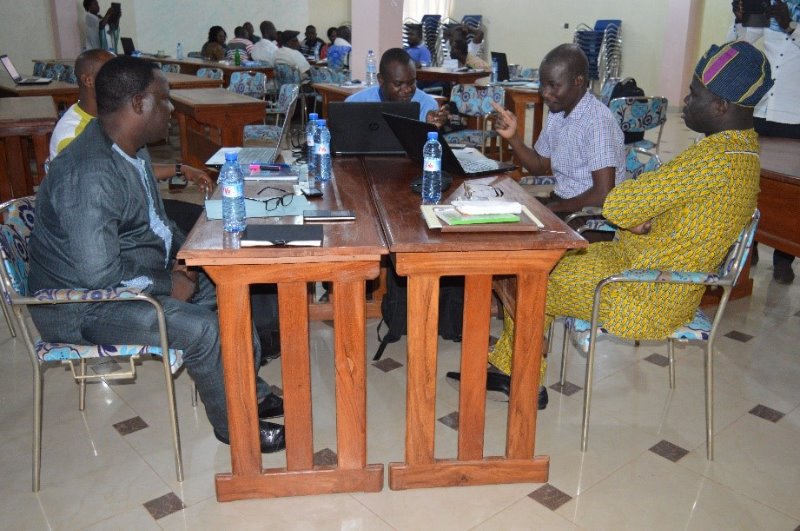 PHOTO3.jpg
(Filesize: 102KB)
PHOTO3.jpg
(Filesize: 102KB)
-
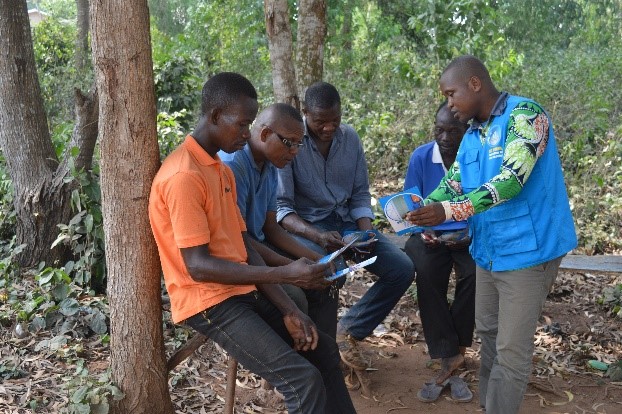 PHOTO1-1.jpg
(Filesize: 118KB)
PHOTO1-1.jpg
(Filesize: 118KB)
-
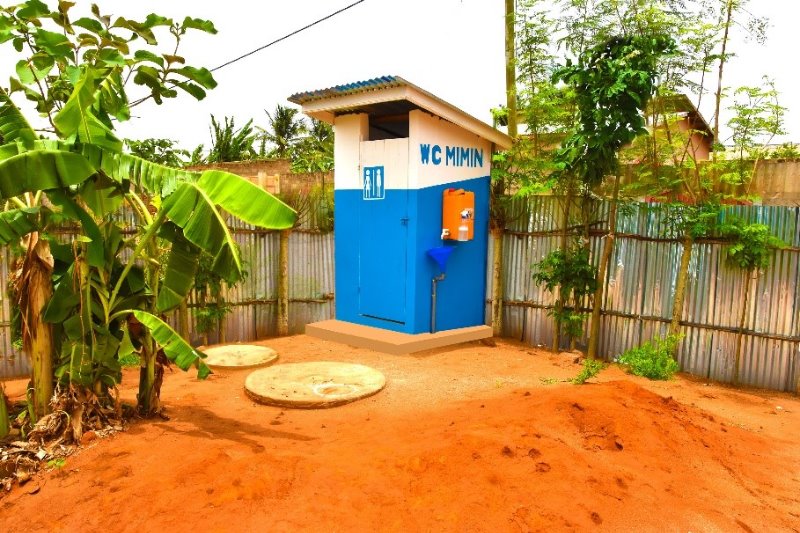 PHOTO1.jpg
(Filesize: 129KB)
PHOTO1.jpg
(Filesize: 129KB)
-
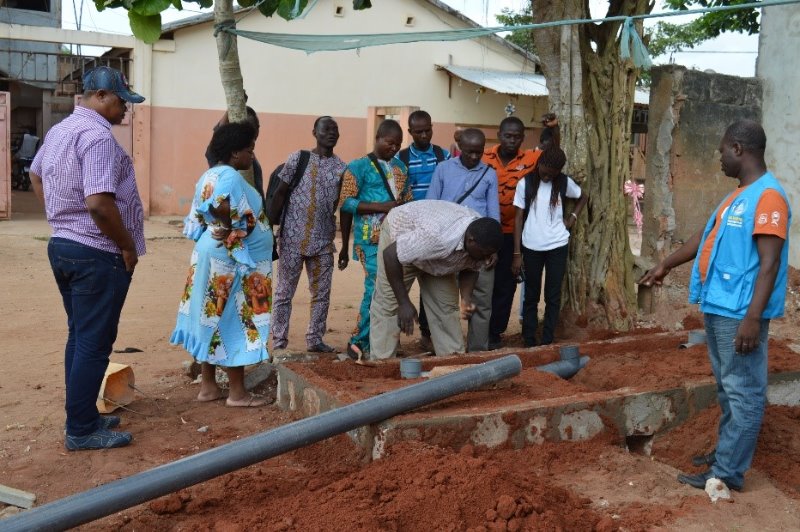 PHOTO2.jpg
(Filesize: 116KB)
PHOTO2.jpg
(Filesize: 116KB)
The following user(s) like this post: cecile
Please Log in to join the conversation.
You need to login to reply- USAIDssd
-

- SSD is a sanitation program funded by USAID, which aims to create sustainable sanitation market for the urban poor in Benin and Côte d'Ivoire. This market will elicit a demand for sanitation services and a reliable supply of high-quality sanitation products and services.
Less- Posts: 50
- Karma: 1
- Likes received: 9
Re: Sanitation Service Delivery Program in Ghana, Ivory Coast and Benin - Updates
BENIN: The Ministry of Health wants to ensure the quality of septic tank emptying services
The standardization of septic tank emptying methods is a major concern for the Beninese government. In Abomey-calavi, Cotonou and Porto Novo, 35 sewage sludge operators had their methods and tools controlled by a joint mission consisting of a representative of the Ministry of Health, the focal point of the municipality of Cotonou and a representative of the office of the Beninese sewers' association. The objective of this supervision visit was to ensure the effective implementation of the "Mimin Emptying" quality standards by the emptyers in order to upgrade them. These include, among other things, the quality of the emptying service, price compliance and the wearing of personal protective equipment. Vidange Mimin is an innovative service that connects households via a telephone platform that allows them to easily access sewage sludge trucks. This service is implemented as part of the Sanitation Service Delivery (SSD) urban sanitation project.[/left][/right]
The standardization of septic tank emptying methods is a major concern for the Beninese government. In Abomey-calavi, Cotonou and Porto Novo, 35 sewage sludge operators had their methods and tools controlled by a joint mission consisting of a representative of the Ministry of Health, the focal point of the municipality of Cotonou and a representative of the office of the Beninese sewers' association. The objective of this supervision visit was to ensure the effective implementation of the "Mimin Emptying" quality standards by the emptyers in order to upgrade them. These include, among other things, the quality of the emptying service, price compliance and the wearing of personal protective equipment. Vidange Mimin is an innovative service that connects households via a telephone platform that allows them to easily access sewage sludge trucks. This service is implemented as part of the Sanitation Service Delivery (SSD) urban sanitation project.[/left][/right]
Learning and Communication Manager SSD|PSI Côte d’Ivoire
The following user(s) like this post: cecile, TAKO
Please Log in to join the conversation.
You need to login to reply
Share this thread:
- Markets, finance and governance
- Sanitation as a business and business models
- Progress so far ... Sanitation Service Delivery Program (PSI with PATH and WSUP, funded by USAID) - Ghana, Ivory Coast and Benin
Recently active users. Who else has been active?
Time to create page: 0.392 seconds







